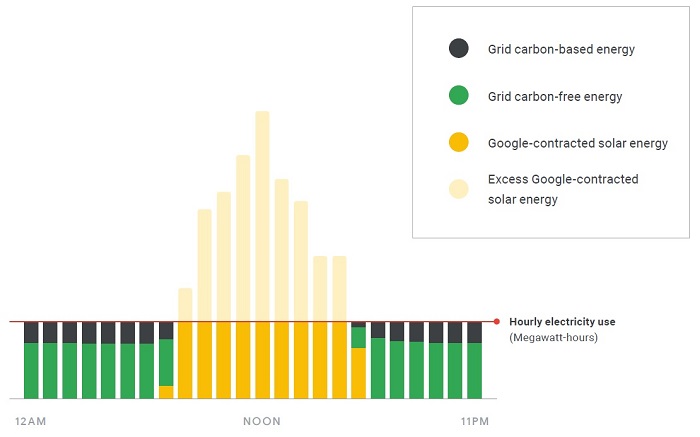- DER
- Energy Cloud
Guidehouse Insights' Beyond 100% Renewable Challenge: Google Progress Report

In April 2018, Guidehouse Insights issued a challenge to Google and other leading retail and IT companies, calling on them to move beyond 100% renewable energy targets and to embrace the Energy Cloud vision. The challenge called for boosting storage capacity, enrolling energy assets in demand response (DR) and virtual power plants (VPPs), ensuring local energy procurement, and other tasks that would further bolster corporate sustainability leaders’ positions.
While not a formal response to the challenge, Google’s Moving Toward 24/7 Carbon-Free Energy at Data Google’s Centers report indicates the level of severity at which one of the leading corporate distributed energy resource (DER) deployers is looking at exceeding its initial corporate sustainability targets. Nearly 1 year after Guidehouse Insights advocated for moving beyond 100% renewable energy, it is time to explore what insights Google’s report offers.
Findings from the Field or the Data Center
Google’s report updates readers on the company’s progress in efforts to ensure that no data center ever relies on fossil-based energy. While the report shows global progress across data centers (with varying success depending on the region), three takeaways are of relevance to corporate sustainability and energy managers at global companies looking to lead in the energy transformation:
- Target clean energy deployment in areas where the grid is still carbon intensive: Google emphasizes the analysis of marginal electricity generation throughout its report. The implementation of carbon-free energy sources can have a more significant effect on emissions in grid regions that rely on fossil fuels to meet peak electricity demand. Google notes that some of its data centers are in regions where carbon-free sources, like hydropower, already supply marginal electricity. Adding clean energy or storage in areas where fossil fuels provide marginal power will result in greater emissions reductions than in areas where the grid is comparatively clean.
A Day of Inconsistent Hourly Matching with Carbon-Free Power

(Source: Google)
- Power purchase agreements (PPAs) provide an immediate carbon-free energy boost: Where signing a PPA has historically placed a risk-burden on the corporate signer, in the fall of 2018, Microsoft announced its role in co-developing volume firming agreements that reduce corporations’ exposure to the weather-related risks of renewable electricity generation.
- Barriers to clean energy procurement stem from existing regulations rather than high prices or technological limitations: This finding might signal Google’s desire for utilities and state regulators to embrace business models that improve flexibility in meeting sustainability targets. As utilities work to strengthen their relationships with customers, it might be in their best interest to integrate with a diverse portfolio of commercial and industrialscale DER technologies. Updated regulations would not only allow corporations to position themselves for success in a world of increased climate change awareness, but it would also provide utilities with access to a more diverse array of grid resources.
Beyond Renewable: Strategies for 2019
Guidehouse Insights continues to find the market trending toward a distributed and intelligent clean energy ecosystem. Accordingly, Google’s 24x7 carbon-free target should be applauded. It is, however, important to emphasize the symbiotic relationships between all DER in the clean energy ecosystem. Google cites a technological gap in long-term storage capacity. However, onsite storage, fuel cells and clean generation, and enrollment of all distributed generation and load in DR programs or VPPs will help to optimize the value of carbon-free energy for corporate sustainability leaders. In fact, solutions that simultaneously pair carbon-free energy with other DER technologies are necessary to provide the infrastructure for 24/7 carbon-free commerce.